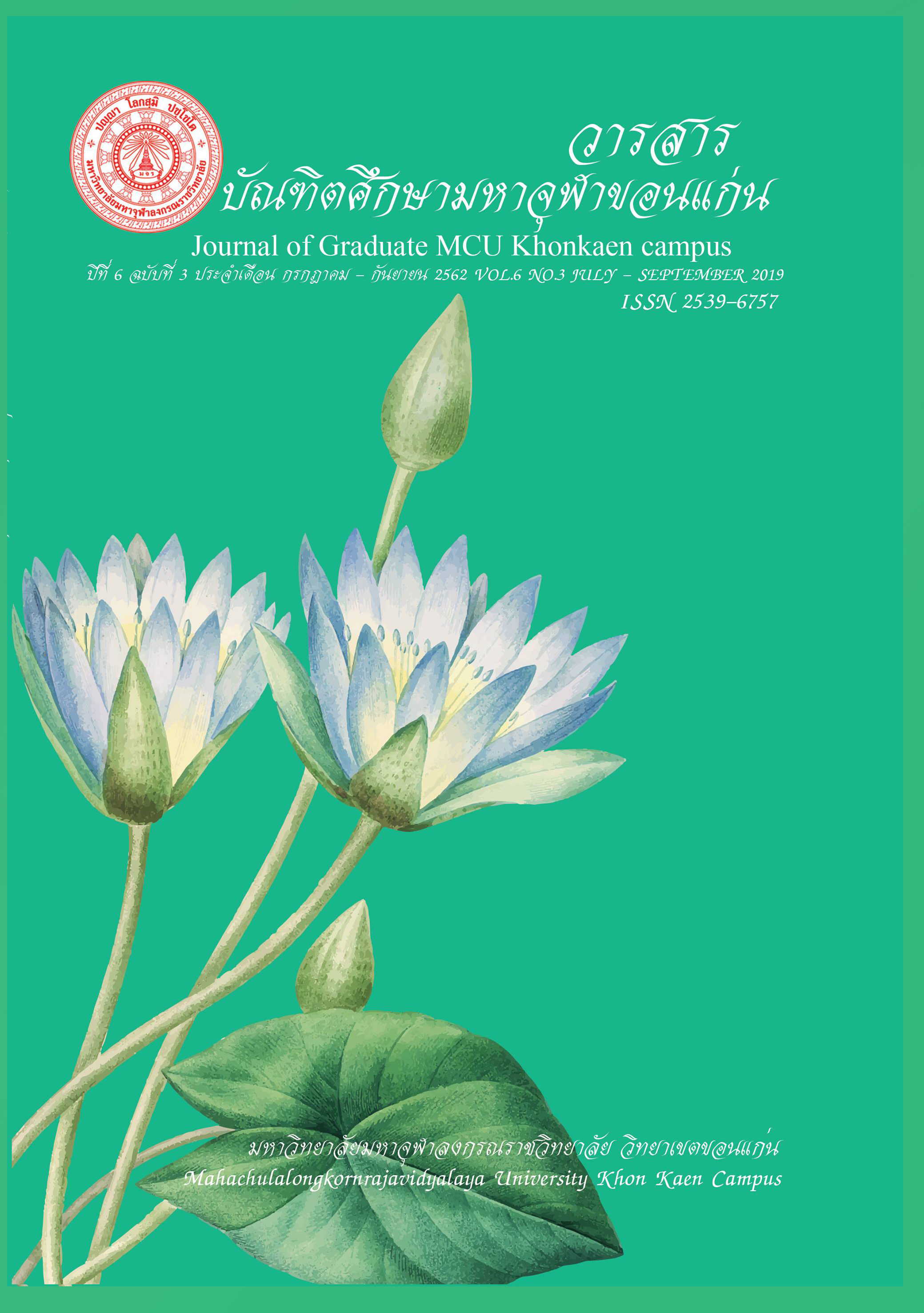กลยุทธ์การพัฒนาภาวะผู้นำการเปลี่ยนแปลงเชิงพุทธสำหรับผู้บริหารสถานศึกษา โรงเรียนพระปริยัติธรรม แผนกสามัญศึกษา
Main Article Content
บทคัดย่อ
การวิจัยนี้มีวัตถุประสงค์เพื่อ (1) ศึกษาสภาพภาวะผู้นำการเปลี่ยนแปลงเชิงพุทธสำหรับผู้บริหารสถานศึกษา โรงเรียนพระปริยัติธรรม แผนกสามัญศึกษา (2) พัฒนากลยุทธ์การพัฒนาภาวะผู้นำการเปลี่ยนแปลงเชิงพุทธสำหรับผู้บริหารสถานศึกษา โรงเรียนพระปริยัติธรรม แผนกสามัญศึกษา (3) นำเสนอกลยุทธ์การพัฒนาภาวะผู้นำการเปลี่ยนแปลงเชิงพุทธสำหรับผู้บริหารสถานศึกษา โรงเรียนพระปริยัติธรรม แผนกสามัญศึกษา
ใช้ระเบียบวิธีวิจัยแบบผสานวิธี (Mixed Methods Research) ระหว่างการวิจัยเชิงคุณภาพ (Qualitative Research) และการวิจัยเชิงปริมาณ (Quantitative Research) โดยการเก็บข้อมูลจากการสัมภาษณ์เชิงลึก (In-depth Interview) จากผู้ให้ข้อมูลสำคัญ (Key Informants) ที่เป็นผู้ทรงคุณวุฒิ รวมทั้งจากผู้มีส่วนได้เสียที่เกี่ยวข้อง จากนั้นนำมาสังเคราะห์เป็นรูปแบบเบื้องต้น ก่อนที่จะนำเสนอต่อเวทีสนทนากลุ่มเฉพาะ (Focus Group Discussion) เพื่อพัฒนารูปแบบให้มีความสมบูรณ์ขึ้น การวิจัยเชิงปริมาณ ใช้การศึกษาวิจัยเชิงสำรวจ (Survey Research) จากแบบสอบถาม (Questionnaire) และนำเสนอต่อประชาพิจารณ์ (Public Hearing) เพื่อหาข้อสรุปในผลงานวิจัย
ผลการวิจัยพบว่า
- สภาพภาวะผู้นำการเปลี่ยนแปลงเชิงพุทธสำหรับผู้บริหารสถานศึกษา โรงเรียนพระปริยัติธรรม แผนกสามัญศึกษา ภาคกลาง กลุ่มที่ 1 ได้ตัวแปรที่สำคัญ 40 ตัวแปร รวม 4 ด้าน คือ (1) ด้านวิสัยทัศน์ ได้ค่าเฉลี่ย 4.38มีความสำคัญที่ผู้นำควรสร้างวิสัยทัศน์ในองค์กรรวมถึงการมีเจตคติที่เหมาะสมกับตำแหน่งหน้าที่และความรู้ความสามารถ(2) ด้านความชำนาญ ได้ค่าเฉลี่ย 4.48มีความสำคัญที่ผู้นำควรมีความหมั่นเพียรในการฝึกฝนการปฏิบัติงานในรูปแบบใหม่ ๆ เพื่อพัฒนาคุณภาพของการทำงาน (3) ด้านมนุษยสัมพันธ์ ได้ค่าเฉลี่ย 4.41มีความสำคัญที่ผู้นำควรมีความสุภาพ อ่อนโยน เอาใจใส่บุคลากร ที่ปฏิบัติงาน เพื่อให้งานบรรลุเป้าหมาย และ (4) ด้านคุณธรรม ได้ค่าเฉลี่ย 4.43 มีความสำคัญที่ผู้นำควรส่งเสริมและช่วยเหลือให้ผู้ใต้บังคับบัญชาให้พัฒนาตนเอง โดยใช้เหตุผลในการตัดสินใจ ในการบริหารจัดการ และผู้นำควรมีความใส่ใจที่จะแก้ไขข้อผิดพลาดในการบริหาร ด้วยความซื่อสัตย์สุจริต
- พัฒนากลยุทธ์การพัฒนาภาวะผู้นำการเปลี่ยนแปลงเชิงพุทธสำหรับผู้บริหารสถานศึกษาโรงเรียนพระปริยัติธรรม แผนกสามัญศึกษา ภาคกลาง กลุ่มที่ 1 ผู้บริหารต้องมีแนวคิดใหม่ ๆ วิสัยทัศน์กว้างไกล มีแนวคิดในอนาคต วิเคราะห์และกำหนดทิศทาง กล้าตัดสินใจ มีความคิดเชิงสร้างสรรค์ มีทักษะด้านเทคโนโลยีใหม่ ๆ มีการวางแผน มีความซื่อสัตย์สุจริต มีความรู้ความสามารถ ส่งเสริมการศึกษา มีทัศนคติต่องานที่ดี มีจุดหมายปลายทางที่ชัดเจน มีฉันทะ วิริยะ จิตตะ วิมังสา ต้องทำให้สำเร็จยึดหลักพรหมวิหารธรรม 1
- เสนอกลยุทธ์การพัฒนาภาวะผู้นำการเปลี่ยนแปลงเชิงพุทธสำหรับผู้บริหารสถานศึกษาโรงเรียนพระปริยัติธรรม แผนกสามัญศึกษา ภาคกกลาง กลุ่มที่ 1 ผู้บริหารต้องมีวิสัยทัศน์ มีประสบการณ์การสอนและประสบการณ์ด้านการวิจัย มีความสามารถในการบริหารจัดการ และต้องมีทัศนคติต่อการเป็นผู้นำ ต้องมีบุคลิกภาพดี เป็นคนจริงใจ มีการวางตัวเหมาะสม มีความสามารถ มีสติปัญญาดี มีการตัดสินใจดี สามารถแก้ปัญหาเฉพาะหน้าได้ดี มีทักษะทางสังคม และต้องเป็นคนที่มีมนุษยสัมพันธ์ที่มีความสุภาพ อ่อนโยน เอาใจใส่บุคลากรที่ปฏิบัติงาน มีความกระตือรือร้น พร้อมให้คำปรึกษาแนะนำที่ถูกต้อง และหมั่นตรวจสอบข้อบกพร่อง
Article Details
เอกสารอ้างอิง
สงเคราะห์เกี่ยวกับเด็กและสตรี”, วิทยานิพนธ์รัฐประศาสนศาสตรดุษฎีบัณฑิต,
(คณะรัฐประศาสนศาสตร์: สถาบันบัณฑิตพัฒนบริหารศาสตร์, 2554).
จันทรานี สงวนนาม, ทฤษฎีและแนวปฏิบัติในการบริหารสถานศึกษา, (กรุงเทพมหานคร: บุ๊คพอยท์,
2545), หน้า 13.
ชรัตน์ จีนขาวขำ , การศึกษาภาวะผู้นำการเปลี่ยนแปลงของผู้บริหารสถานศึกษาตามการรับรู้ของ
ข้าราชการครู สังกัดสำนักงานเขตพื้นที่การศึกษาชลบุรี เขต 3, วิทยานิพนธ์ กศ.ม มหาวิทยาลัย
บูรพา, 2547), หน้า 20.
ทิพาวดี เมฆสวรรค์,กล้าคิด กล้าทำ กล้านำ กล้าเปลี่ยน, พิมพ์ครั้งที่ 2., (กรุงเทพมหานคร :
เอ็กซเปอร์เน็ท,2545), หน้า 10.
วิโรจน์ สารรัตนะ, การบริหารการศึกษา: นโยบายและยุทธศาสตร์เพื่อการบรรลุผล,
(กรุงเทพมหานคร: โรงพิมพ์ทิพย์วิสุทธิ์, 2546), หน้า 25.
สงวน รัมพงศ์ และนิตยา รัมพงษ์, ภาวะผู้นำกับธรรมาภิบาลในการบริหารงานองค์กรปกครองส่วน
ท้องถิ่น สถาบันพระปกเกล้า, (กรุงเทพมหานคร: ส เจริญการพิมพ์, 2540). หน้า 83.
Charles E. Scott and John J Siegfried, “American Economic Association”, American
Economic Review, vol. 102, issu 3: 31-34
J. Ritchie and J. Lewis, Qualitative Research Practice, (London: Sage, /2003), pp. 109 – 137.

